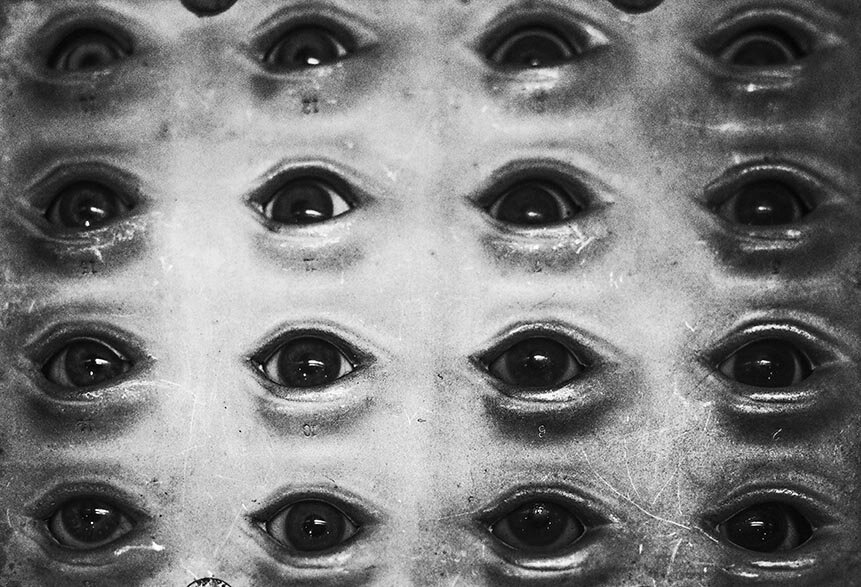ARIADNA LASSER
All rights reserved © Ariadna Lasser
Former film student, Ariadna found her voice and her means of personal expression through photography. Her distinctive dreamy black-and-white images range from surreal street photographs to imaginative self-portraits. Almost all of her work was created in her home city of Buenos Aires, Argentina.
“My references are various, but the most important is Daidō Moriyama. Meeting the photographers and artists who participated in Provoke was a before and after in my way of seeing and thinking about photography”
When and where did you start photographing? Who has been the reference of your photography?
AL: I started taking photos in 2013, when I was 25 years old. Before that I did some studies related to the visual arts and cinema, but only when I started doing photography workshops did I feel that I had found a medium with which I felt capable of expressing myself. I live in Buenos Aires, Argentina, and since I don't usually travel, almost all of my photos are taken in the city.
My references are various, but the most important is Daidō Moriyama. Meeting the photographers and artists who participated in Provoke was a before and after in my way of seeing and thinking about photography. And I cannot fail to mention Francesca Woodman, who I met some time later and who taught me a lot about the possibilities of the self-portrait.
What do you want to communicate with your images?
AL: I still don't know clearly. First of all, my photos are something I do for myself and they are born from moments in which I let myself get carried away more by emotions or "instinct", not by plans or something rational. I take photos because that action is the refuge that I found in front of my most self-critical and self-demanding side, and the images that I get function as anchors in my life. When I look at them again, I feel that they contain everything that I lived and felt at that moment, it is a bit like synesthesia, and I also feel that it is a way of rescuing all those moments and ephemeral beings that for some reason moved me. On the other hand, I post and share my photos, so I must also be trying to communicate with others. Maybe it has to do with my shyness, and the fact that I don't feel as comfortable when I have to put into words what I feel.
“I cannot fail to mention Francesca Woodman, who I met some time later and who taught me a lot about the possibilities of self-portrait”
What does street and documentary photography mean to you?
AL: I don't know if I could define what street photography is or what its limits are, but I can say that it was my first photographic love. At a time of much confinement and discomfort, it was what allowed me to get ahead. As I began to look at what was happening on the street, I was able to stop thinking about myself and my problems for so long and let myself be carried away by everything that was happening around me. I love its playful and unexpected quality, the fact that I can visit the same corner every day and something different is always going to happen. Because of my shyness, for now I only feel capable of taking photos without interacting too much with people, but something that fascinates me about street photography is how for many photographers it is a good tool to communicate and meet people and their stories.
How are your life experiences reflected in the symbolisms that we see in your photographs?
AL: Something that appears a lot is religious symbolism. I am not a believer but they are images that generate curiosity and that always end up attracting me, I think because since I was a child I saw them without knowing their history or what they represented and being images often extremely bloody they generated a great impact on me. Over the years I stopped observing attentively and naturalized them, but since I started taking photos I renewed my view and I reengaged myself with these figures and these symbols, and again I felt shocked.
Do you remember your first exhibition / publication? What motivated you to publish your documentary and street photography work?
“Something that appears a lot is religious symbolism. I am not a believer but they are images that make me curious and that always end up attracting me”
AL: In 2016 I had the opportunity to have my first individual exhibition, and then I participated in other collectives. I really belong to digital photography and am too used to seeing my images only on the computer, so it was an important learning moment and a very different experience to see my photos on paper. I don't know if I had a special motivation at the time or if at first I only did it because I was given the opportunity, but it was very exciting to be able to hear what other people have to say about what I do, and what it means to them when they refer to my photos. At the end of the day and beyond the fact that, as I said before, I take my photos for myself, knowing that they can be liked and that they are interpreted in such different ways is something beautiful.
All rights reserved ©Ariadna Lasser















